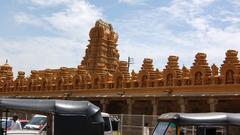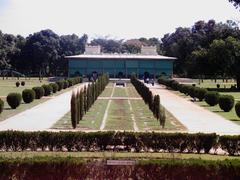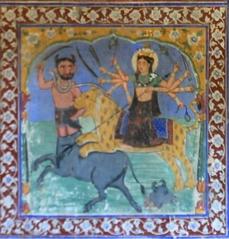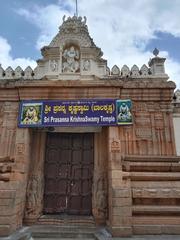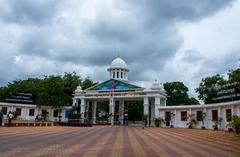Regional Museum of Natural History Mysore: Visiting Hours, Tickets, and Travel Guide
Date: 04/07/2025
Introduction
Situated on the scenic banks of Karanji Lake in Mysore, the Regional Museum of Natural History (RMNH) Mysore is a premier destination for anyone interested in India’s natural heritage. Established in 1995 as the southern regional office of the National Museum of Natural History, the museum has evolved into a vital center for environmental education, interactive learning, and public engagement. With the Chamundi Hills as a backdrop and proximity to Mysore Zoo, RMNH Mysore offers an immersive environment that highlights biodiversity, conservation, and the relationship between humans and nature (ExploreBees; Wikipedia).
Visitors can expect thoughtfully curated galleries such as the Biological Diversity Gallery, the Life Through the Ages Gallery, and interactive spaces designed for all ages and abilities. The museum stands out for its accessibility features, including a botanical garden with Braille signage and tactile exhibits for the visually impaired (Museums of India; Trawell.in).
With free entry and engaging educational programs, RMNH Mysore is an essential part of Mysore’s tourism circuit, appealing to families, students, researchers, and eco-tourists alike. This comprehensive guide provides detailed information on visiting hours, ticketing, accessibility, exhibits, travel tips, and nearby attractions to ensure a rewarding experience (Incredible India; MyTrip Guide; Yappe.in).
Contents
- Introduction
- Historical Background and Significance
- Visitor Information: Visiting Hours, Tickets & Accessibility
- Key Exhibitions and Thematic Galleries
- Museum Layout and Facilities
- Visitor Experience, Travel Tips, and Special Events
- Nearby Attractions
- Frequently Asked Questions (FAQ)
- Summary and Recommendations
- References
Historical Background and Significance
Establishment and Mission
RMNH Mysore was inaugurated on May 20, 1995, as part of the Ministry of Environment and Forests’ initiative to promote environmental education and awareness in southern India (ExploreBees; Museums of India). The museum’s mission is to serve as a non-formal education center, emphasizing interactive and experiential learning about biodiversity, wildlife, and conservation.
Architectural and Geographical Context
The museum’s location on Karanji Lake, with the Chamundi Hills in the background and next to the Mysore Zoo, creates a unique setting that reinforces its focus on nature and biodiversity (ExploreBees). The complex features inclusive facilities, such as a garden for the visually impaired with Braille signage and tactile elements (Museums of India).
Visitor Information: Visiting Hours, Tickets & Accessibility
- Visiting Hours: 10:00 AM – 6:00 PM, Tuesday to Sunday. Closed on Mondays and select national holidays (Incredible India).
- Entry Fee: Free for all visitors.
- Location: T.N. Pura Road, Siddhartha Nagar, Mysuru, Karnataka 570011. Accessible from Mysururailway station and close to major attractions.
- Accessibility: Wheelchair accessible; tactile exhibits and Braille signage for visually impaired visitors.
- Guided Tours: Available on request for individuals and groups. Check with the museum in advance.
Key Exhibitions and Thematic Galleries
Biological Diversity Gallery
This gallery showcases the flora, fauna, and geology of southern India, with a focus on the Western Ghats. Exhibits include dioramas, life-size models, preserved specimens, and geological samples (Museums of India; MyTrip Guide).
Life Through the Ages Gallery
An immersive tunnel walks visitors through the evolutionary timeline of life on Earth, featuring fossils, reconstructions, and interactive displays (Museums of India; Trawell.in).
Ecology Gallery
This section explains ecological concepts like food chains, nutrient cycles, and habitat diversity, with dioramas, audiovisual aids, and hands-on exhibits (Evendo).
Man and the Environment Gallery
Explore the interrelationship between humans and nature and the importance of sustainable practices (Wikipedia).
Conservation for Development Gallery
Learn about conservation efforts, endangered species, and the importance of protecting natural resources through multimedia presentations (Trawell.in).
Museum Layout and Facilities
Building Structure and Accessibility
The main building houses galleries and educational spaces, with ramps and tactile exhibits throughout. The entrance features striking artwork, including a metal elephant sculpture (Trawell.in).
Botanical Garden and Interpretive Trail
The outdoor garden features local tree species and Ayurvedic plants, along with a sensory trail designed for visually impaired visitors, complete with Braille signage and audio commentary (Wikipedia).
Discovery Room
Designed for children and school groups, this room offers interactive exhibits, puzzles, and games. It operates from 10:00 AM to 1:00 PM and 2:00 PM to 4:30 PM (Trawell.in).
Additional Facilities
- Bioscience Computer Room: Access to digital biodiversity resources (MysuruLive).
- Cafeteria: Snacks and drinks available.
- Restrooms: Clean and accessible.
- Library: A resource for further reading.
- Parking: Free, ample space.
Visitor Experience, Travel Tips, and Special Events
- Best Time to Visit: Weekday mornings for a quieter experience.
- Ideal Duration: 1–1.5 hours for a comprehensive visit.
- Family-Friendly: Interactive spaces and workshops cater to children.
- Photography: Allowed in most areas; flash may be restricted.
- Special Events: Film screenings, workshops, and temporary exhibitions are held regularly (Yappe.in).
Nearby Attractions
- Mysore Zoo: Adjacent to the museum, home to diverse animal species.
- Karanji Lake: Ideal for bird-watching and nature walks.
- Mysore Palace: A historic site 3 km away.
- Chamundi Hills: A spiritual and scenic landmark.
- Folklore Museum, Railway Museum: Additional cultural sites nearby (Incredible India).
Frequently Asked Questions (FAQ)
Q: What are the Regional Museum of Natural History Mysore visiting hours?
A: 10:00 AM to 6:00 PM, Tuesday through Sunday. Closed on Mondays and national holidays.
Q: Is there an entry fee?
A: No, entry and parking are free for all visitors.
Q: Are guided tours available?
A: Yes, on request—ideal for groups and school visits.
Q: Is the museum accessible for visitors with disabilities?
A: Yes, with ramps, tactile exhibits, and Braille signage throughout.
Q: Can I take photos inside the museum?
A: Yes, but flash photography may be restricted in some exhibits.
Summary and Visitor Recommendations
The Regional Museum of Natural History Mysore is a unique and indispensable destination that bridges education, conservation, and cultural tourism. Its galleries, interactive spaces, and accessible design create an engaging environment for visitors of all ages and abilities (ExploreBees; Wikipedia). The museum’s proximity to Mysore’s major attractions allows for a well-rounded visit, and its commitment to visitor comfort, safety, and accessibility is evident throughout. Early weekday visits are recommended for a peaceful experience, and combining your trip with other local sites enriches your understanding of Mysore’s natural and cultural legacy (Incredible India; Yappe.in). To stay informed about events, follow the museum’s official channels and consider using the Audiala app.
References
- ExploreBees: Regional Museum of Natural History Mysore
- Wikipedia: Regional Museum of Natural History Mysore
- Incredible India: Regional Museum of Natural History Mysore
- Yappe.in: Regional Museum of Natural History Mysore
- Museums of India: RMNH Mysore
- Trawell.in: Regional Museum of Natural History Mysore
- MyTrip Guide: Regional Museum of Natural History Mysore
- Evendo: Regional Museum of Natural History Mysore
